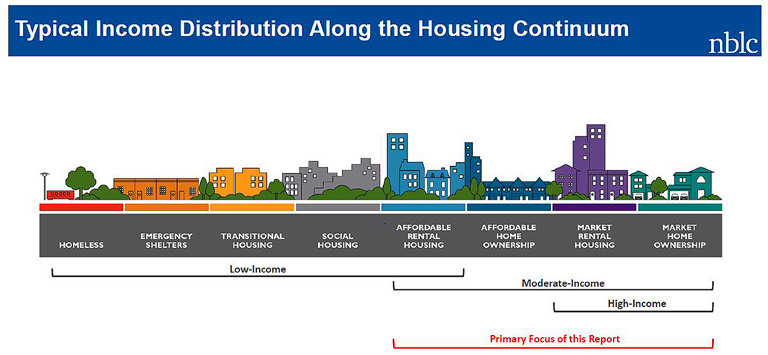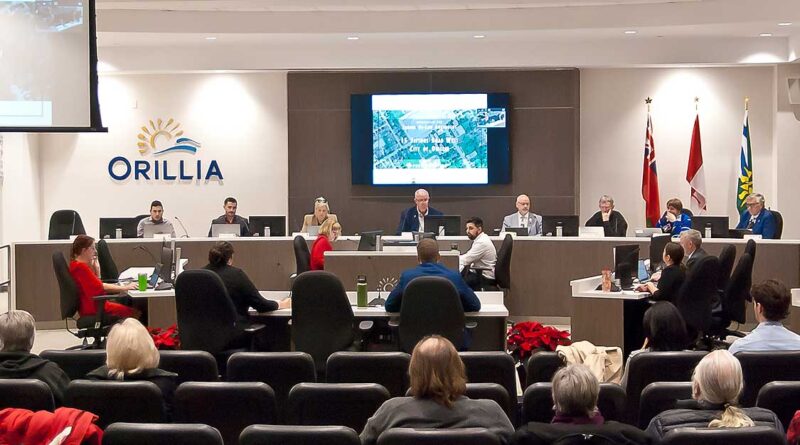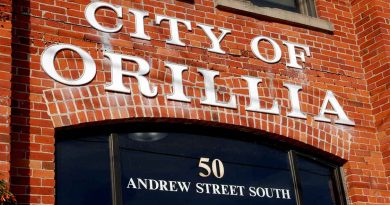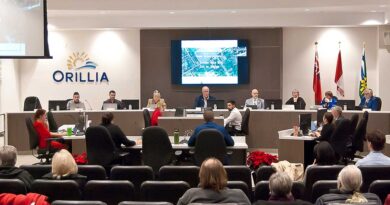Council Preview
By John Swartz
Orillia’s first of two monthly summer meetings happens July 15 at 2 p.m. The top half of the meeting has little on it, other than the formalities of opening the meeting and will go straight to the open public forum.
If there is no one wishing to address council, they will go from gavel, to approving agenda and minutes to a closed session. The closed session has only one item on the schedule and that is to hear from staff about a settlement offer from Rexton Developments.
That’s a name which has not been seen on a meeting agenda in a very long time. Rexton owns property on the east side of Atherley Road. It forms a significant part of land the City has wanted to see some development of for decades, and it is a major part of the Downtown Tomorrow plan earmarked for housing.
When council returns in front of the cameras, the first item is a holdover from the last meeting about installing four way stop signs at Brant and Canice \Streets and at Tecumseh and Lightfoot Drive.
They will only be stalled until the end of the construction season because of higher traffic levels detouring around Laclie Street reconstruction. The cost will be $5,000 to install and remove the signs.

The next item is a report about on demand transit service from the transportation and parking working group. The now defunct transit advisory committee formed a working group to look into the matter and they relied on a toolkit developed by the Canadian Urban Transit Association to create a plan for Orillia.
Council is being asked to receive the report and hand it over to staff to develop the action required to start an on demand service in 2025.
The working group says smaller vehicles can be used, which would allow travel on streets buses cannot use, and regular service would end at 7 p.m. and go completely on demand during evenings and on weekends.
People would still go to a bus stop, but buses, or smaller vehicles would not roll until a pickup is booked by phone. The hours of service will be the same as now, but if the data collected shows use of the new service weekend service hours could be expanded to match Monday to Friday operating hours. Fares would be the same as current.
Experience from other communities shows, in some cases where the on demand service feeds into the regular service, an increase of transit use, and where a transit service did not exist high use.
Next is a report from the affordable housing working group about hiring a housing coordinator.
A coordinator was hired in 2023 on a trail basis with a two-year contract endingin June 2025. The committee believes the contract should be extended or the position be made permanent. Staff want council to make a decision in order to be included in the 2025 budget.
Next is a report about snow plowing. The current budget is $1.5 million. New roads in the West Ridge lead staff to believe the City should buy two more plows ($900,000) which will mean hiring 4 operators and an increase to the operating budget of $235,000.
There are also more sidewalks and staff say one more operator ($34,000 annually) is needed. There already is equipment not being used, so buying additional plows is not needed.
We’ve been lucky the past couple of years, there were no occasions snow piled up from plowing had to be removed and only one time in 2022.
Many people would like snow piled up either side of driveways carted off. The City does not do this currently and staff say if it becomes a thing, it would have $700,000 annually for operating costs and $2.4 million of equipment would need to be bought.
Staff would like to implement cross training on equipment (primarily so operators can use road plows and sidewalk plows depending on need) and would like to be able to add $242,000 to the budget for this.
Council’s action here is to send the report to the 2025 budget committee.
We have a tree problem. If one takes time to look while driving on the Highway 12 Bypass, one will notice a lot of dead trees. Once one notices, seeing dead trees everywhere is an easy task. It seems a significant number of trees are dying. One property owner (just beyond City limits) has removed a number of dead Pines over the past two years and still has 5 dead or dying trees to remove. These are tress that were healthy two years ago.
Not being a tree expert, whether the ones on the Bypass or elsewhere mentioned above are Pines or other varieties is hard to say.
Councillor Tim Lauer has been on the case of increasing the number of trees in the City for a number of years. The City does have a budget meant to encourage planting trees with the objective of increasing the inventory, but it seems we are now in a position of trying to maintain the counts we have, rather then adding.
The City removed 264 trees from parks in 2023 (and replaced only 40). That’s not counting trees cut down to stop the Emerald Ash Borer. The city cut down 94 ash trees since 2022, but only replaced 63.
The City says it needs to cut down 50 trees in the downtown for sidewalk repairs, which may or may not have been necessary had the City had an ongoing sidewalk maintenance program over the years. Those trees will likely not get replaced until the reconstruction of Mississaga Street and several cross streets happens.
Staff would like council to refer the report to the 2025 and 2026 budgets to add $20,600 each year. They would also like to develop a 2026 budget report to study urban forestry management.
Nice House You’ve Got There
The three remaining reports all relate to development.
Development and engineering has a report from consultants Nick Michael and Josh MacLeod of N. Barry Lyon Consultants Ltd, regarding a Housing Attainable Supply Action Plan.

The objective is to set conditions for:
“Rental or ownership housing that is adequate in condition, appropriate in size, available, and affordable to households with incomes between 80% and 120% of median area income.” According to a County of Simcoe definition.
It would seem once one reaches 100% of income anything beyond that is unobtainable. This is not in regard to social housing.
They have been studying the conditions in Orillia for some time and found the supply of housing is not meeting demand. House prices are up in a range of 172% to 219% over the last 10 years while incomes have gone up only 37%.
The county has initiated this new program, which reduces to a new intialism – ASAP – and would like the City to join (it did in 2023) in a more substantive way.
The aim is to develop housing in the range of $215K to $311K for ownership and $1,116 – $1,579 as rental housing.
Among the things the consultants recommend is to open up publicly owned land for development. Most of the publicly owned land in Orillia is parkland, though three are a number of parking lots downtown which could be developed for parking and housing.
They are also developing an inventory of housing construction plans designed to sail through approval processes; and they advocate easing planning restrictions.
The interesting thing is there are restrictions, developed over time, for some very good reasons, like not building housing on former industrial land which could cause health issues, or building housing near hazardous industry, disrupting storm water flow, and the list goes on.
That is aside from destroying old neighbourhoods for modern, cheap, housing that will never stand as long as the houses they replaced did.
In their investigation the consultants found the price of housing should be from $214k to $310k for existing average incomes in Orillia, but the average price of houses listed in Orillia is $670K. This is pretty unattainable until household income reaches more than $176K.
They also found there are no rental units available to those earning less than $75K.
Interestingly, a key component of what the County office offers is advocacy, presumably with higher levels of government, but the report says nothing about Real Estate Investment Trusts which have been buying up houses and condos at blinding speeds to be turned into long and short-term rentals, the latter being turned into a business model thanks to Airbnb.
There is no data indicating the amount of housing in Orillia owned by trusts SUNonline/Orillia is aware of, while data exists for many other communities where whole neighbourhoods have been bought up by corporations and turned housing from a place for families to live into businesses.
Until COVID, the City was regularly hosting investment trust marketing groups on bus tours of the City, so it is likely we have a number of companies owning homes and not homeowners living in them.
It seems the start of the housing crisis rests with corporate ownership of housing taking homes off the market for living in long-term and making them profit centers. Maybe someone could advocate for change of investment regulations and tax breaks.
They also advocate increased funding, both municipal and provincial/federal funding. This means giving tax dollars to developers, and/or lowering fees. It is worth noting the City has already spent hundreds of thousands of dollars on much needed affordable housing, but we still have the same problems.
The range of ‘solutions’ offered are complex and many of them, if utilized on large scale, will radically change not just Orillia, but communities in general, and might be characterized as giving away the store to developers, without addressing the causes of crisis mentioned above.
Staff also have a report recommending development fees change. This is a response to Ontario’s Bills 23 and 185. One of the changes is developers no longer have to consult with staff about their plans before submitting Official Plan and zoning by-law amendments, and draft plans of condominium and subdivision applications.
This puts more work on staff to go through submissions to check against regulations and requirements which may have been caught earlier when it was cheaper for all concerned to know.
One of the fee changes is to increase the Official Plan application fee from $7,500 to $15,000 for developers who skip the consultation process. Staff are proposing fee changes for other types of development applications be, in most cases, double (or more) for developers who want to skip the line.
And while the premier has been blaming municipalities for development delays, City staff are also asking council to impose fees on developers who do not follow up on submissions within set time limits.
The last report from development and engineering is about securities the City imposes on developers. These are mainly financial guarantees developers will do what they say they are going to do, and that no damage to City property or neighbouring property happens, and if so the money to fix issues comes from developers.
The City was charging 100% of the value of the work across the board for a range of activities (connections to water and sewer, storm water management, etc.), but is proposing some of the guarantees they impose do not need to be for 100%. The reductions apply to development activities within the developments that do not directly connect to City services or concerns, but for which if not done correctly will still cause problems..
Staff believe the new percentages are still high enough to encourage developers to comply with regulations and building codes.
Motions
Councillors Jay Fallis and Jeff Czetwerzuk have a notice they intend to introduce a motion at the August 12 meeting to install 4-way stop signs at the intersection\ of Orion Boulevard and Monarch Drive .
Councillor Lauer has an enquiry motion for staff to report on, “The feasibility of implementing permanent all-way stops at the corners of Borland Street East and Peter Street North, Jarvis Street and Peter Street North, and Brant Street East and Canice Street.”
Councillor Fallis has an enquiry for staff to report on, “he feasibility of permitting bicycle vendors on Orillia streets with the following limitations:
– A maximum of five vendor permits may be issued per year on a first come, first serve basis
– Vendors must only be permitted to solicit on community and collector roads
– Vendors must only be permitted to sell food and drinks
There is a by-law to levy a head tax on Soldier’s Memorial Hospital, Georgian College and Lakehead University. Municipalities are not allowed to impose property taxes, which would be a lot higher. The amounts involved are: Soldiers’ $18,450; Georgian $87,975; Lakehead $130,950.
Council meetings are open to the public or can be watched on the City’s Youtube channel.
(Photos by Swartz – SUNonline/Orillia and Images Supplied)



